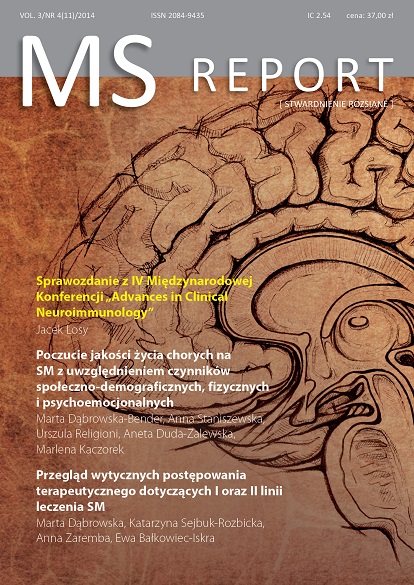The quality of life of patients with multiple sclerosis and socio-demographic, physical and psycho-emotional Original article
Main Article Content
Abstract
Background: Multiple sclerosis (MS) is a disease of the central nervous system (CNS), resulting from damage to the myelin sheath of nerve fibers. MS most commonly affects young people between twenty and forty years of age. A major problem patients are impaired physical, psychological, social, familial, sexual, and higher nervous activity. In turn, progressive, but unpredictable and highly individualized course of the disease in conjunction with the debilitating symptoms of the operation creates a chronic stress situation which affects negatively on the perceived quality of life.
Aim of the study: The aim of this study was to observe and know the subjective assessment of the quality of life of patients with multiple sclerosis in the functioning of the physical, psycho-emotional and taking into account socio-demographic and disease duration.
Material and methods: The study group consisted of 63 patients with multiple sclerosis who were treated at the National Rehabilitation Centre in Dabek near Mlawa. Material collected by diagnostic survey using a standardized MSIS-29 (Multiple Sclerosis Impact Scale).
Results: The study found that the disease significantly impairs the physical function of patients and interferes with their psycho-emotional sphere. At the same time were found to have statistically significant relationships between social factors – demographic, and variables, ie. Limitation in social life and recreation (p = 0.020), the need to stay at home due to health status (p = 0.012), shaking hands and legs (p = 0.006), a feeling of stiffness (p = 0.017), difficulty moving around the house (p = 0.019), urgent need to go to the toilet (p = 0.049), and dependence on other people connected with the exercise of different activities (p = 0.019).
Conclusions: Scale used MSIS-29 confirmed gradually progressive loss of physical and social patients with multiple sclerosis and has identified a number of disturbances in the area of psycho patients. At the same time pointed out the need for comprehensive care for patients for early diagnosis and treatment of depression, take physical and social, as well as improving the quality of life by planning for the long-term strategy of the population support.
Article Details
Copyright © by Medical Education. All rights reserved.
References
2. Jasińska J.: Stwardnienie rozsiane. Poradnik chorego i terapeuty. Olsztyn 2008.
3. Braley T.J., Chervin D.C.: Fatigue in multiple sclerosis: mechanisms, evaluation and treatment. Sleep 2010; 33(8): 1061-1067.
4. Kaynak H., Altintas A., Kaynak D. et al.: Fatigue and sleep disturbance in multiple sclerosis. Eur. J. Neurol. 2006; 13(12): 1333-1339.
5. Kotterba S., Eren E., Fangerau T. et al.: Sleepiness and fatigue in multiple sclerosis – comparison of different measuring instruments. Fortschr. Neurol. Psychiatr. 2003; 71(11): 590-594.
6. Stanton B.R., Barnes F., Silber E.: Sleep and fatigue in multiple sclerosis. Mult. Scler. 2006; 12(4): 481-486.
7. Trojan D.A., Arnold D., Collet J.P. et al.: Fatigue in multiple sclerosis: association with disease – related, behavioral and psychosocial factors. Mult. Scler. 2007; 13: 985-995.
8. Kazibutowska Z.: Diagnostyka, rokowanie i leczenie w SM w kontekście zagadnień rehabilitacji. Polski Przegląd Neurologiczny 2008; 4: 43-47.
9. Karakiewicz B., Stala C., Grochans E. et al.: Ocena wpływu wybranych czynników socjodemograficznych na jakość życia osób chorujących na stwardnienie rozsiane. Annales Academie Medicae Stetinensis 2010; 56(3): 107-112.
10. Fruehwald S., Loeffler-Stastka H., Eher R. et al.: Depression and quality of life in multiple sclerosis. Acta Neurol. Scand. 2001; 104(5): 257-261.
11. Łabuz-Roszak B., Kubicka-Bączyk K., Pierzchała J.: Jakość życia chorych na stwardnienie rozsiane – związek z cechami klinicznymi choroby, zespołem zmęczenia i objawami depresyjnymi. Psychiatria Polska 2013; 3: 433-442.
12. Beiske A.G., Naess H., Aarseth J.H. et al.: Health-related quality of life in secondary progressive multiple sclerosis. Mult. Scler. 2007; 13: 386-392.
13. Hwang J.E., Cvitanovich D.C., Doroski E.K., Vajarakitipongse J.G.: Correlations between quality of life and adaptation factors among people with multiple sclerosis. Am. J. Occup. Ther. 2011; 65(6): 661-669.
14. Isaksson A.K., Ahlstrøm G., Gunnarsson L.G.: Quality of life and impairment in patients with multiple sclerosis. J. Neurol. Neurosurg. Psychiatry 2005; 76: 64-69.
15. Kargarfard M., Eetemadifar M., Mehrabi M. et al.: Fatigue, depression and health-related quality of life in patients with multiple sclerosis in Isfahan, Iran. Eur. J. Neurol. 2012; 19 (3): 431-437.
16. Papuć E., Stelmasiak Z.: Factors predicting quality of life in a group of Polish subjects with multiple sclerosis: Accounting for functional state, socio-demographic and clinical factors. Clin. Neurol. Neurosurg. 2012; 114(4): 341-346.
17. Sehanovic A., Dostovic Z., Smajlovic D., Avdibegovic E.: Quality of life in patients suffering from Parkinson’s disease and multiple sclerosis. Med. Arh. 2011; 65(5): 291-294.
18. Einarsson U., Gottberg K., Fredrikson S.: Activities of daily living and social activities in people with multiple sclerosis in Stockholm County. Clin. Rehabil. 2006; 20(6): 543-551.
19. Wu N., Minden S.L., Hoaglin D.C.: Quality of life in people with multiple sclerosis. J. Health Hum. Serv. Adm. 2007; 30(3): 233-267.
20. Lorencowicz R., Jasik J., Komar E.: Wpływ wsparcia społecznego dla jakości codziennego funkcjonowania osoby chorej na stwardnienie rozsiane. Piel. Neurol. Neurochir. 2013; 5: 205-215.
21. Jaracz K., Kalfoss M., Górna K., Bączyk G.: Quality of life in Polish: Psychometric properties of the Polish WHOQOL – Bref. Scand. J. Caring Sci. 2006; 20(3): 251-260.
22. Skalska-Izdebska R., Bojczuk T., Hołys E.: Jakość życia u osób chorych na stwardnienie rozsiane. Young Sports Science 2011; 3: 277-282.
23. Humańska M.A., Śnieg P., Rezmerska L., Haor B.: Jakość życia a sprawność funkcjonalna chorych na stwardnienie rozsiane. Piel. Neurol. Neurochir. 2013; 5: 185-232.

